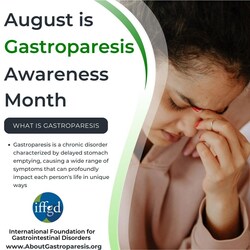International Foundation for Gastrointestinal Disorders (IFFGD) raises awareness for Gastroparesis Awareness Month to shed light on the varied impact on the quality of life for individuals.
MOUNT PLEASANT, S.C., July 13, 2023 /PRNewswire/ — Gastroparesis Awareness Month, established by IFFGD in 2016, takes place every year during August. IFFGD utilizes its platform to support the gastroparesis community, raise awareness and shed light on a debilitating condition affecting countless individuals worldwide. Out of 100,000 people, approximately 10 men and 40 women have gastroparesis1. It is a chronic disorder characterized by delayed stomach emptying, causing a wide range of symptoms that can profoundly impact each person’s life in unique ways.

For over thirty years, IFFGD has advocated for more research to help improve diagnostic and treatment options available to improve the quality of life for those with GI disorders like gastroparesis. Ceciel Rooker, IFFGD President, explained “The symptoms, burdens, and challenges that many face while living with gastroparesis can be extremely debilitating and life-threatening. We strive to promote research initiatives and support patient education. By amplifying the voices of those affected by gastroparesis, we aim to drive progress public awareness with this year’s campaign.”
Gastroparesis (GP) is a condition of slowed stomach emptying with no intestinal blockage. It is a complex condition in which the muscles in the stomach fail to function properly, leading to slowed or incomplete digestion. Healthcare providers often refer to it as delayed gastric emptying. Symptoms usually occur during or after a meal and can appear suddenly or gradually.
A variety of distressing symptoms typically include:
- Nausea and/or vomiting
- Stomach pain and discomfort
- Dry heaves
- Stomach fullness after a normal-sized meal
- Early fullness and the inability to finish a meal
Additional symptoms, such as bloating, stomach discomfort or pain, loss of appetite, and heartburn, among others, may occur. If left unmanaged, gastroparesis can lead to additional complications, including severe dehydration, obstruction, poor insulin control in individuals with underlying diabetes, malnutrition due to poor absorption of nutrients, and emotional challenges, further exacerbating the impact on individuals’ lives.
One of the key aspects of gastroparesis is its heterogeneous nature, affecting individuals differently. While some individuals may experience mild symptoms that can be managed with lifestyle modifications and medication, others face severe symptoms that significantly impair their quality of life.
Ceciel T. Rooker, IFFGD President, stated that “the impact of gastroparesis extends beyond physical symptoms. Many individuals with gastroparesis face psychological and emotional challenges as they navigate the complexities of their condition. Living with chronic symptoms, uncertainty, and the need to adapt daily routines can lead to frustration, anxiety, and feelings of isolation. It is crucial to address the holistic needs of individuals with gastroparesis.”
In recognition of Gastroparesis Awareness Month, IFFGD will launch a campaign to acknowledge the varied impacts on individuals who live with gastroparesis — symptom burdens and how this may present differently from person to person, finding the right treatment options and lifestyle modifications — using the hashtag #GPreality. During Gastroparesis Awareness Month, IFFGD invites you to share your gastroparesis story and make your voice heard by adding #GPreality to all social media posts.
Click here to download the official Gastroparesis Awareness Month material.
[1] Jung HK, Choung RS, Locke GR III, et al. The incidence, prevalence, and outcomes of patients with gastroparesis in Olmsted County, Minnesota, from 1996 to 2006. Gastroenterology. 2009;136(4):1225–1233.
About IFFGD
The International Foundation for Gastrointestinal Disorders (IFFGD) is a nonprofit education and research organization dedicated to improving the lives of people affected by a chronic gastrointestinal disorder.
Media Contact:
Hayley McCorkle
414-946-1799
361922@email4pr.com
SOURCE International Foundation for Gastrointestinal Disorders (IFFGD)














